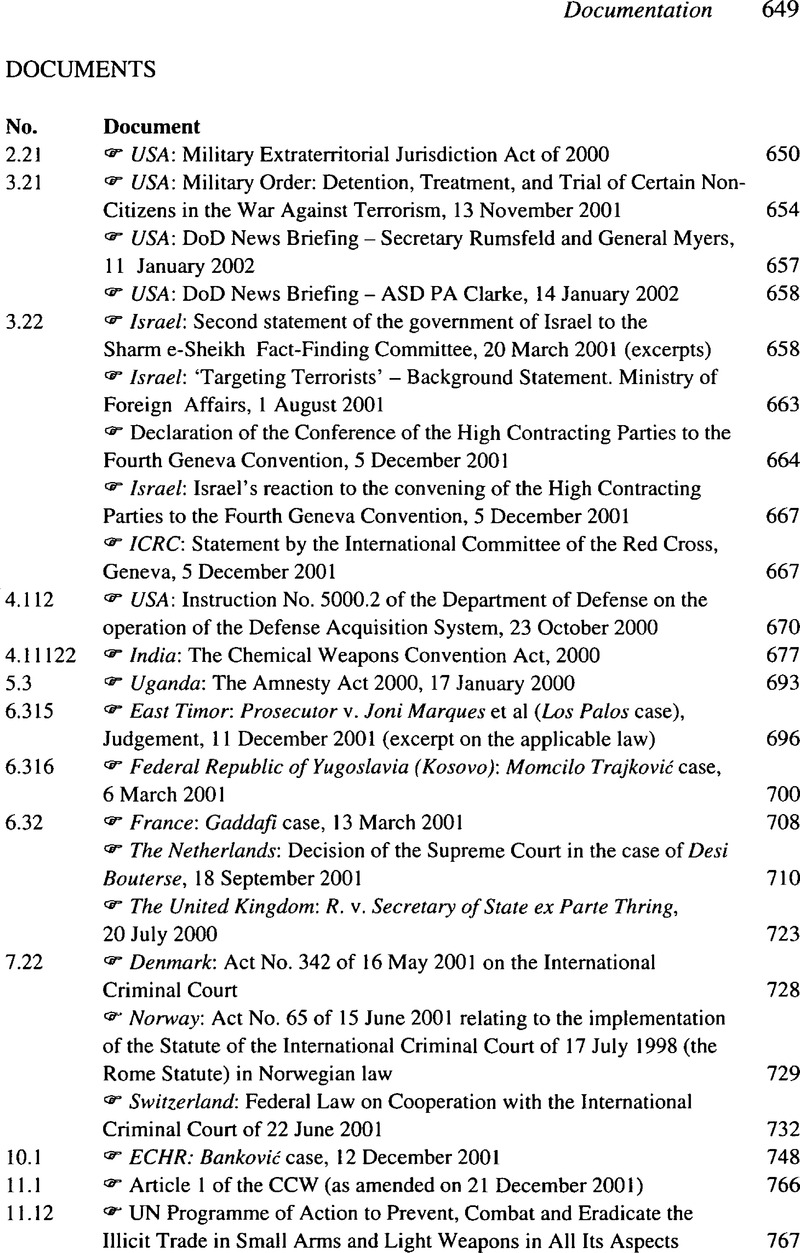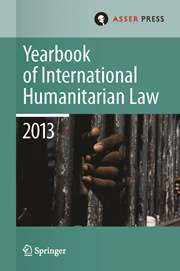No CrossRef data available.
Article contents
Documents
Published online by Cambridge University Press: 17 February 2009
Abstract

- Type
- Documentation
- Information
- Copyright
- Copyright © T.M.C. Asser Instituut and the Authors 2001
References
2. UNTAET Regulation No. 15/2000.
3. Under Art. 95 of the Judiciary (Organisation) Act, the Procurator General of the Supreme Court may ‘in the interests of the law‘ appeal in cassation to the Supreme Court against decrees and decisions of Courts of Appeal, District Courts and Sub-District Courts (known as ‘cassation in the interests of the law’). The aim of such appeal is to ensure the uniform application of the law. Such a decision of the Supreme Court does not affect the rights of the parties in the particular case (Art. 98 of the Judiciary (Organisation) Act).
4. The decision is reprinted in 3 YIHL (2000) p. 677Google Scholar.
5. The grounds of appeal in cassation and the explanatory notes of acting Advocate General N. Keijzer can also be found on-line in the source referred to in note 1.
6. The examining magistrate at the District Court of Amsterdam then granted the application for the institution of a preliminary judicial examination by the Public Prosecution Service on 30 January 2001 (Institute's Collection No. 5026). He adopted the opinion of the Court of Appeal that the claim could be based on the Implementation Act. He rejected the claim in so far as it was based on the Wartime Criminal Law Act. Application was also made to the examining magistrate in Amhem because the Military Judge of the District Court of Amhem had jurisdiction in respect of the prosecution of war crimes as defined in the Wartime Criminal Law Act. The examining magistrate too considered that the Wartime Criminal Law Act did not apply. Unlike the examining magistrate in Amsterdam, however, he also rejected the claim that the Implementation Act had retroactive effect. He thus dismissed the application for the institution of a preliminary judicial investigation (decision of 22 December 2000, Institute's Collection No. 5025).
7. The Supreme Court used the Dutch translation.
8. See 20 NYIL (1989) pp. 274–275Google Scholar.
9. See 4 NYIL (1973) pp. 433–435Google Scholar.
10. The term ‘wet in materiele zin’ means general binding provision (in stead of binding on one person only) and includes not only Acts of Parliament, but also Royal Decrees, Ministerial Orders, Provincial and Municipal Decrees and in the view of some commentators, Treaties.
11. Art. 7 reads: ‘1. No one shall be held guilty of any criminal offence on account of any act or omission which did not constitute a criminal offence under national or international law at the time it was committed. Nor shall a heavier penalty be imposed than the one that was applicable at the time the criminal offence was committed. 2. This Article shall not prejudice the trial and punishment of any person for any act or omission which, at the time when it was committed, was criminal according to the general principles of law recognised by civilised nations.’
Art. 15 reads: ‘1. In time of war or other public emergency threatening the life of the nation any High Contracting Party may take measures derogating from its obligations under this Convention to the extent strictly required by the exigencies of the situation, provided that such measures are not inconsistent with its other obligations under international law. 2. No derogation from Article 2, except in respect of deaths resulting from lawful acts of war, or from Articles 3, 4 (para. 1) and 7 shall be made under this provision. 3. Any High Contracting Party availing itself of this right of derogation shall keep the Secretary General of the Council of Europe fully informed of the measures which it has taken and the reasons there for. It shall also inform the Secretary General of the Council of Europe when such measures have ceased to operate and the provisions of the Convention are again being fully executed.
12. This was the express request of the Procurator General.
13. See 19 NYIL (1988) p. 341Google Scholar.
14. See 4 NYIL (1973) pp. 429–430CrossRefGoogle Scholar.
15. The United Kingdom has withdrawn its derogation as of 26 February 2001, except in relation to Crown Dependencies. Turkey reduced the scope of its derogation by communication to the Secretary General of the Council of Europe dated 5 May 1992.
16. Article 56 § 1 enables a Contracting State to declare that the Convention shall extend to all or any of the territories for whose international relations that State is responsible.




